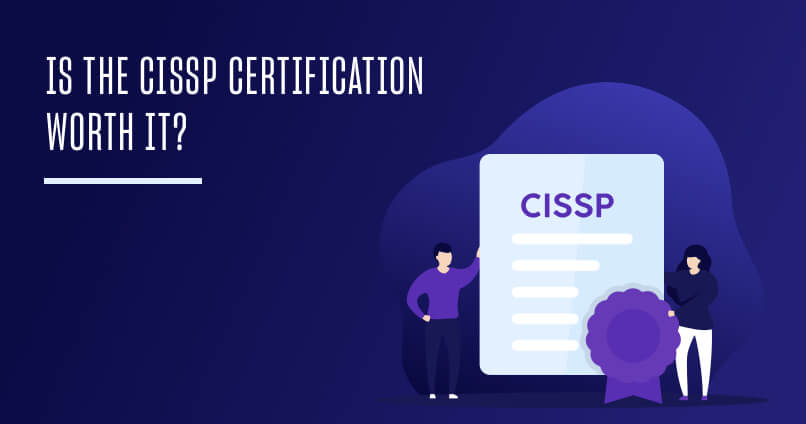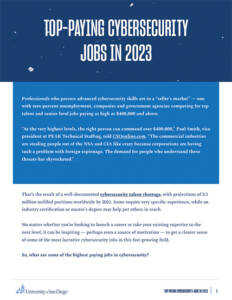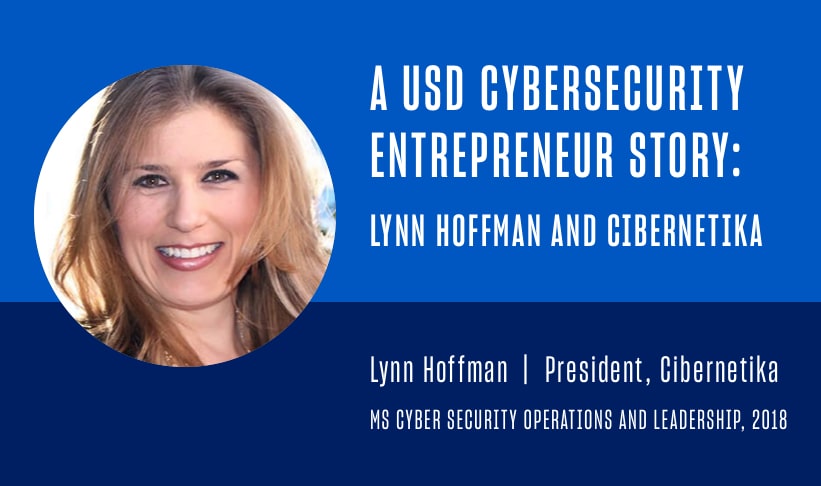The CISSP is one of many professional cybersecurity certifications, but is it right for your career goals and aspirations? What does the certification entail, how much does it cost and is it required for any of the positions you’ve been eyeing? We answer all of these questions — and more — in this comprehensive guide to the CISSP certification.
What Is the CISSP Certification?
Why is the CISSP Certification Desirable?
What Are the Requirements to Pursue the CISSP?
What Jobs Can You Get with a CISSP?
How to Prepare for the CISSP Test?
What Information is on the CISSP Test?
How Much Does the CISSP Test Cost?
Is Getting your CISSP Certification Worth it?
Why Consider a Master’s in Cybersecurity
Career Advice from CISSP Certification Holders
Other Comparable Certifications
What is the CISSP Certification?
The CISSP refers to the Certified Information Systems Security Professional certification, which was created by the International Information Systems Security Certification Consortium (ISC2). This certification is ideal for experienced security practitioners, managers and executives, including those in the following positions:
- Chief Information Officer
- Director of Security
- IT Director/Manager
- Security Systems Engineer
- Security Analyst
- Security Manager
- Security Auditor
- Security Architect
- Security Consultant
- Network Architect
Why is the CISSP Certification Desirable?
According to the ISC2, the CISSP certification is accredited, recognized and endorsed by leading organizations around the world. The CISSP may be a requirement at the Department of Defense for certain types of jobs. It also meets the conditions of the ISO/IEC Standard 17024.
Even if the CISSP isn’t required, it’s a valuable cybersecurity certification that can advance your skills and increase your industry knowledge.
What are the Requirements to Pursue the CISSP?
The ISC2 outlines the following CISSP experience requirements:
- At least five years of cumulative, paid, full-time work experience in two or more of the eight domains of the CISSP CBK (or body of knowledge):
- Security and Risk Management
- Asset Security
- Security Architecture and Engineering
- Communications and Network Security
- Identity and Access Management
- Security Assessment and Testing
- Security Operations
- Software Development Security
- You can satisfy one year of work experience with a four-year college degree or an approved credential from the CISSP Prerequisite pathway.
If you don’t have the required experience to obtain a CISSP, another option is the Associate of ISC2 accreditation.
What Jobs Can You Get with a CISSP?
- Chief Information Officer: This is the executive chiefly responsible for an organization’s information and data security.
- Director of Security: This senior-level position is in charge of a company’s overall security strategy. This may include managing systems, educating employers, regulating employee and visitor policies, conducting gap analyses to determine any vulnerabilities, etc.
- IT Director or IT Manager: These are both upper level positions. A director is more of a senior management position.
- Security Systems Engineer: This position is responsible for matters related to IT security. This may include software security, responding to security threats, resolving technical issues and more.
- Security Analyst: A cybersecurity analyst will plan and implement security measures to protect the computer networks and systems of a company or organization.
- Security Manager: A security or cybersecurity manager is typically responsible for safeguarding valuable company data and managing the information systems team.
- Security Auditor: These professionals work with companies and organizations to provide audits of online security systems.
- Security Architect: A security, or cybersecurity, architect, is typically a senior-level position that designs organization-wide network and computer security architecture.
- Security Consultant: This person typically assesses the security and risk of a business or organization and ultimately provides solutions and recommendations on safety measures and protection.
- Network Architect: The people in this position design and build networks, including local area networks, wide area networks and intranets.
CISSP Salary Range
As with any position, your salary range with a CISSP certification will depend on the specific job and company, your experience and background, the skills required and geographic location. But according to ISC2 “cybersecurity professionals who earn the CISSP are among the most sought-after security experts in the world.”
Here are some examples of average CISSP salaries:
- Globally — $92,639
- North America — $120,552
- Asia-Pacific — $57,179
- Europe, Middle East & Africa — $81,568
- Latin America — $22,014
How to Prepare for the CISSP Test
The ISC2 provides a variety of different training options based on your learning style, flexibility and budget:
- Classroom-based
- Online instruction-led
- Online self-paced
- Team training options
There are official self-study tools and resources available, and the ISC2 also recommends participating in a virtual CISSP study group.
No matter which method of exam preparation you choose, it’s helpful to download and review the CISSP Exam Outline.
What Information is on the CISSP Test?
According to CISSP Exam Outline, topics include:
- Security and Risk Management
- Asset Security
- Security Architecture and Engineering
- Communication and Network Security
- Identity and Access Management (IAM)
- Security Assessment and Testing
- Security Operations
- Software Development Security
The exam is 3 hours long and consists of 100 to 150 questions.
How Much Does the CISSP Exam Cost?
Standard registration in the United States is $749, but pricing may change based on location. The exam pricing page has the most updated information. There are also fees for rescheduling or canceling the exam.
Is Getting Your CISSP Certification Worth It?
The CISSP certification is certainly worth consideration if you’re looking to obtain a senior-level cybersecurity position. Certifications carry a lot of weight and can significantly increase a cybersecurity professional’s salary potential. They are often a great boost to your resume and, in some cases, they are required.
Why Consider a Master’s in Cybersecurity?
A master’s degree is a great next step after securing a CISSP certification. An advanced degree will add valuable experience and certainly increase your earning potential.
There are many reasons why a master’s degree is worth the investment. In some cases it’s required, but even if it isn’t, a master’s degree can help ensure a higher salary, job security and expanded career opportunities.
Career Advice from CISSP Certification Holders
The CISSP is one of the world’s most valued information technology and information security certifications. For me, obtaining the CISSP was a game changer in my cybersecurity career, as it opened up many more job opportunities, projects, and enhanced my credibility in the field. – Lynn Hoffman, President Cibernetika, M.S. Cyber Security Operations and Leadership, 2018
Other Comparable Certifications
Which cybersecurity certification is right for you? In addition to the CISSP, here are some of the most popular ones:
- Certified Information Security Manager (CISM): This certification focuses on governance, risk management, compliance and international security measures. It is geared toward managers who design, oversee and assess an enterprise’s information security infrastructure.
- Certified Information Systems Auditor (CISA): This certification focuses on auditing, controlling, monitoring and assessing information systems. It’s ideal for information system auditors, information security professionals, governance professionals and enterprise leadership.
- Certified in Risk and Information Systems Control (CRISC): The CRISC certification is designed specifically for IT professionals who have hands-on experience with risk identification, assessment and evaluation, risk response, risk monitoring, IS control design and implementation and IS control monitoring and maintenance.
- CompTIA Security+: The CompTIA Security+ is designed for entry-level security professionals. The CompTIA Security+ certification meets the ISO 17024 standard and is approved by the U.S. Department of Defense to fulfill Directive 8570.01-M requirements.
- Certified Ethical Hacker: The CEH (Practical), offered by the EC-Council, is an exam that teaches valuable hands-on testing skills and is geared toward entry-level applicants or those who are looking for an introduction to, or refresher on, ethical hacking.
- Certified Cloud Security Professional (CCSP): The CCSP is recommended for professionals who wish to demonstrate their proficiency in cloud computing and data security, including cloud architecture and design and application security considerations.
- GIAC Security Essentials (GSEC): This certification is designed for professionals who want to demonstrate their hands-on proficiency in IT systems and information security tasks. It covers general security best practices and real-world applications.
CISSP Certification FAQs
Q: How is the CISSP different from other cybersecurity certifications?
A: The CISSP certification is geared toward experienced security practitioners, managers and executives.
Q: How much does the CISSP exam cost?
A: Standard registration in the United States is $749, but pricing may change based on location.
Q: What topics are on the CISSP test?
A: The CISSP Exam Outline outlines all of the topics and is a good place to start.
Q: Should I get a CISSP certification or a master’s degree?
A: It depends on your career goals and aspirations. Obtaining both a CISSP certification and master’s degree in cybersecurity is a great way to set yourself apart from other candidates and position yourself for success in any type of senior-level leadership role.
Interested in Advancing Your Cybersecurity Education?
If you are interested in taking your cybersecurity career to the next level, consider furthering your education with the University of San Diego — a highly regarded industry thought leader and education provider that offers a 100% online Master of Science in Cyber Security Operations and Leadership. This degree program features practical, cutting-edge curriculum taught by expert instructors who share insights drawn from highly relevant industry experience.




